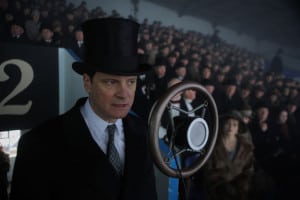KAMELLE MACINTYRE
Arts Writer
 Colin Firth’s mouth is thin and pursed, the very embodiment of a stiff upper lip; when he speaks with his stammer he pronounces his words through the left side of his mouth. Firth must have held his jaw a certain way to affect the speech and the manner of Prince Albert, Duke of York, later to become King George VI.
Colin Firth’s mouth is thin and pursed, the very embodiment of a stiff upper lip; when he speaks with his stammer he pronounces his words through the left side of his mouth. Firth must have held his jaw a certain way to affect the speech and the manner of Prince Albert, Duke of York, later to become King George VI.
Although the make-up is excellent in its application of lines around his eyes, it is his mouth that seems to take centre stage. It literally is the centre of attention during the final scenes when the King speaks over the radio declaring war.
The King’s Speech covers five years during the 1930s. It is about the protagonist King George and his battle to defeat his arch-nemesis wireless, more commonly known as radio. His handicap is his stutter. To defeat his stammer and conquer the cutting-edge technology of the day, he reluctantly enlists the help of an Australian speech therapist Lionel Logue, played by Geoffrey Rush.Â
Firth’s performance is the engine that drives the movie. The movie is dependent on who this man is and Firth gets to show off a wide emotional range. He embodies the Duke as someone who does not want to be King, a man who reluctantly agrees to get help, who loses his temper, is a loving father to his two daughters and bristles at being called “Bertie” by Logue (he looks good in the excellent costumes as well).
The film is rounded out by the supporting performers. Helena Bonham Carter plays supportive wife Elizabeth, the Duchess of York, later the Queen. While she does not get to show a wide emotional range, we do get to see her shine as she compares her future sister-in-law American Wallis Simpson to a Chinese prostitute and instructs Logue’s wife as to how to address her (Her Majesty first, and after that ma’am, “like ham, not palm”).
Rush as Logue is a speech therapist with unconventional methods who gets the Duke to roll around on the floor and in the funniest scene in the movie, gets him to say swear words over and over again. He is persistent and encouraging, a good foil to Firth’s Bertie.
The underrated Guy Pierce has fun as the narcissistic David, a.k.a. Edward the VII. Michael Gambon plays the old King George V who — although well-meaning — harms rather than helps his son and bemoans wireless as reducing the royal family to actors. Clair Bloom as Queen Mary reinforces the royal rules and culture with “the Firm” when she does not hug David as he is crying and embracing her following the King’s death.
A favourite for best actor, Colin Firth’s performance is the focus of the whole film. Any other nominee winning would be — for me — a major upset.
Leave a Reply